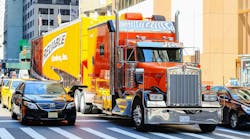A specialized software system developed to help ease traffic congestion in London is now getting a trial run in New York City
MajescoMastek, an IT developer based in Mumbai, India, worked with U.K. software maker Capita Group to create a secure system that captures vehicle license plate information using video cameras — instead of stopping drivers at tollbooths or barriers — as part of a traffic congestion pricing program.
Drivers then paid different roadway usage fees depending on the time of day, with the options of paying charges in person, electronically via the Internet, or even via text messaging with cell phones, says Subu Vasudevan, senior solution architect for MajescoMastek.
New York City is looking at implementing a pilot system, proposed by Mayor Michael Bloomberg (I ) not only to handle current traffic volumes within the city, but also to anticipate future changes when building the system.
“From an IT standpoint, a congestion pricing system can also work here in New York, despite the differences in the two cities,” Vasudevan says. “The technology framework is designed to capture information from drivers - handling significant volumes of transaction and image captures - then process it quickly.”
He adds that MajescoMastek's IT solution for the London project was based on the Microsoft.net framework which enables integration through web services.
Traffic congestion is a huge problem in the U.S., representing a billion-dollar drain on n the nation's economy. Mort Downey, former U.S. Deputy Sec. of Transportation and currently chairman of PB Consulting, noted in a recent speech that in 2005 traffic congestion in the U.S. caused 3.7 billion hours of travel delay and 2.3 billion gallons on wasted fuel, for a total cost of $63 billion.


